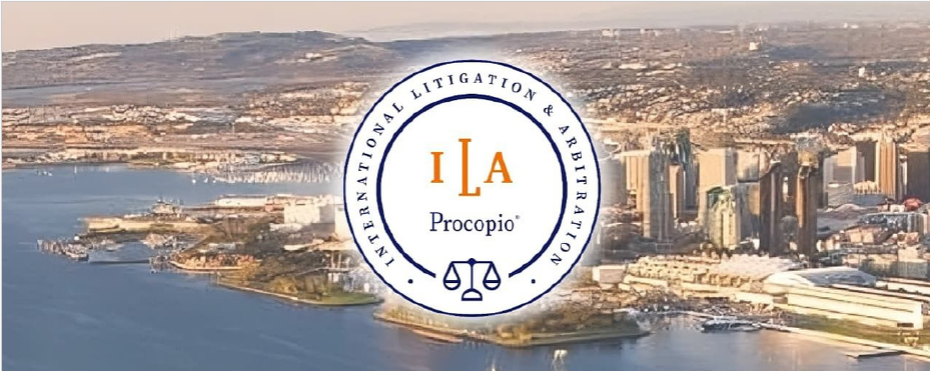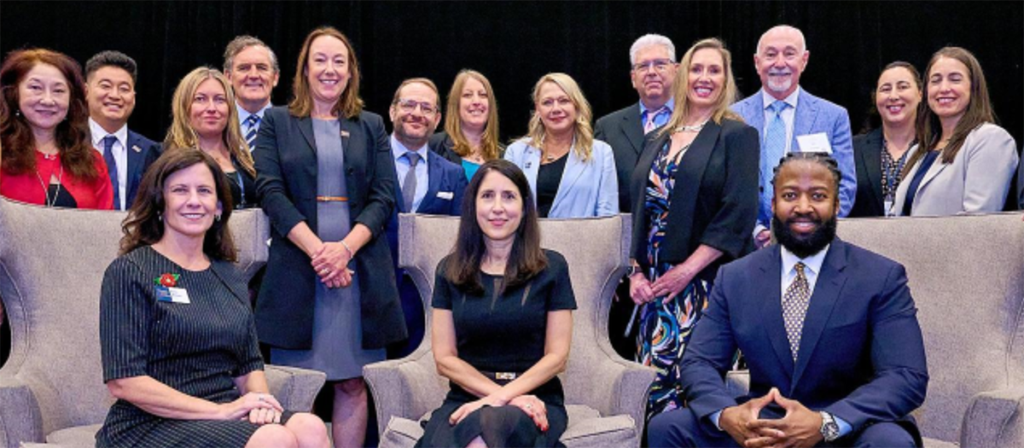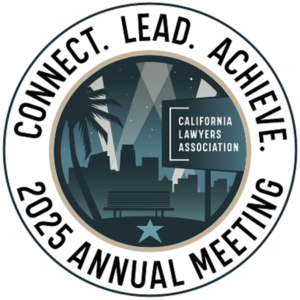International Law and Immigration
ILS News – August 2025
Message from the Chair
Message from the Chair

The Warren M. Christopher International Lawyer of the Year Award honors legal practitioners who render distinguished service in the promotion of the international rule of law or for significant achievement in the practice of international law. The first annual International Lawyer of the Year Award was presented posthumously to Warren M. Christopher in 2011. His long and distinguished career as both a lawyer and statesman embody the ideals of the Award. The article linked here summarizes Warren Christopher’s career and reminds us why his legacy continues to inspire international lawyers.
This year I am pleased to announce that Judge M. Margaret McKeown is the recipient of Warren M. Christopher Internation Lawyer of the Year Award. She will be celebrated at the CLA Annual Meeting Award Reception, Friday September 12, 2025, in Los Angeles, California. In attendance will be delegations joining us from Japan, Vietnam and Pakistan. We look forward to seeing you there.
This month we are co-sponsoring the Procopio Law Firm’s International Litigation & Arbitration Retreat in San Diego on August 28-29, 2025. Speakers will join us from across Mexico, New York, California and Florida and will include two retired California judges who now serve as neutrals, and legal experts from both sides of the border. If you are a CLA member you are eligible to use this discount code: PILAR25CALBAR.
Our first article this month describes extraordinary activity both within the International Criminal Court and the United Nations. And the second article is a comprehensive look at the sweeping tax reform that is better known as the One Big Beautiful Bill Act (OBBBA).
Finally, if you have not signed up for our international conference to Milan, Italy, it is not too late. The conference is perfectly timed in October for participants to experience mild and pleasant weather as they earn MCLE, expand their professional network, see timeless art and fashion, experience traditional Milanese food, world renown wines and gaze upon Lake Como as lunch is served at Hotel Bellagio, Italy.
If you have not yet joined our section. This is your invitation to do so. There is something for everyone and all are welcome.
Theresa Leets
Chair, International Law and Immigration Section
California Lawyers Association
2025 Warren M. Christopher International Lawyer of the Year Award
Judge M. Margaret McKeown

Judge McKeown was appointed to the United States Court of Appeals for the Ninth Circuit in 1998. She graduated from Georgetown University Law Center and holds an honorary doctorate from Georgetown University. Before her appointment, Judge McKeown was the first female partner at Perkins Coie in Seattle and was co-founder of the firm’s Washington, D.C. office. Judge McKeown served as a White House Fellow, where she worked as a Special Assistant to the Secretary of Interior and Special Assistant at the White House. She was also a Japan Society Fellow.
Judge McKeown chairs the Ninth Circuit Workplace Environment Committee and is a member of the National Workplace Conduct Working Group and the Judicial Conference United States Committee on Judicial Conduct and Disability. She also chairs the Ninth Circuit Pacific Islands Committee. She served as president of the Federal Judges Association, chair of the Judicial Conference United States Codes of Conduct Committee (ethics), and chair of the ABA Commission on the 19th Amendment. She serves on the boards of the World Justice Project, the ABA Rule of Law Initiative (former Chair), and the Teton Science Schools, and is on the Council of the American Law Institute and the Judicial Advisory Board of the American Society of International Law.
Judge McKeown is an adjunct professor at Georgetown University Law Center and Instituto Impresa (IE) in Madrid and is Jurist-in-Residence at the University of San Diego School of Law. She has lectured throughout the world on international law, human rights, intellectual property, litigation, ethics, judicial administration, and constitutional law and for more than 25 years has participated in numerous rule of law initiatives with judges and lawyers. Judge McKeown is a member of the American Academy of Arts and Sciences. She received the American Inns of Court Lewis F. Powell, Jr. Ethics and Professionalism Award, the ABA Margaret Brent Women Lawyers of Achievement award, the ABA John Marshall Award, the Georgetown University John Carrol Award, the Federal Bar Association Community Service Award, the Lawyers Club Icon Award, and the Girl Scouts Cool Woman Award, among others. Judge McKeown is the author of Citizen Justice: The Environmental Legacy of William O. Douglas—Public Advocate and Conservation Champion (2022).
Past Webinars
Major Tax Provisions of the One Big Beautiful Bill Act (OBBBA)
August 6 @ 6:00 | PM – 7:00 PM
What are the tax changes in in the OBBBA? And who is impacted? Listen to Neeraj Bhatia an attorney and CPA with over 35 years of expertise in international and domestic tax planning describe the broad implications of this new Act.
Topics will include:
- Permanence of key aspects of the TCJA
- Increases in SALT limitations
- Reinstatement of 100% Bonus Dep & R&D expensing
- Opportunity Zone (OZ) Reform
- Modifications to Section 199A – QBI tax deduction
- Expansion of 1202 Qualified Small Business Stock (QSBS) gains
- International Tax changes – GILTI/ FDII recharacterization Repeal of various clean energy credits
- and many more!

Employment Immigration Changes Under the Trump Administration – Part 2
July 9, 2025 | Noon – 1:00 PM
1 Hour MCLE | Legal Specialization in Immigration & Nationality Law Credit
As global talent mobility, foreign investment, and workforce demand continue to shape the U.S. economy, staying current on employment-based and investor immigration pathways has never been more essential.
This timely two-part webinar series will examine the evolving landscape of employment-based visas, investor programs, and business immigration strategies considering new regulations, adjudication trends, and policy shifts under the current administration.
Part 2 will focus on both legal insights and practical guidance on securing and managing U.S. immigration options for businesses and highly skilled professionals seeking permanent residency. The discussion will include:
- Mandatory interviews for employment based green cards
- Department of Labor Audits, investigations, and employer best practices to balance recruitment strategies with immigration compliance
- Visa bulletin movement, retrogression concerns and alternative pathways for multinational executives, professionals, and skilled workers
- Evaluation of employment history during citizenship application process
- The “Trump Gold Card” – Can investors effectively buy US Citizenship?
Speakers

Carl Shusterman
Carl Shusterman | LinkedIn

Kevin Levine
Kevin Levine | LinkedIn

Josh M. Surowitz
Joshua Surowitz | LinkedIn

Radhika Balaji
Radhika Balaji | LinkedIn
Employment Immigration Changes Under the Trump Administration – Part 1
June 4, 2025 | Noon – 1:00 PM
1 Hour MCLE | Legal Specialization in Immigration & Nationality Law Credit
As global talent mobility, foreign investment, and workforce demand continue to shape the U.S. economy, staying current on employment-based and investor immigration pathways has never been more essential.
This timely two-part webinar series will examine the evolving landscape of employment-based visas, investor programs, and business immigration strategies considering new regulations, adjudication trends, and policy shifts under the current administration.
Part 1 of the series will be a discussion of key updates and emerging trends in nonimmigrant visas and will include:
- The January 2025 modernization of H-1B Final Rule and its increased oversight on entrepreneurs
- Recent H-1B RFE trends including biometrics, prevailing wage issues, and site visits.
- Heightened scrutiny of TN visa applicants at the border amid increased enforcement efforts
- E- Treaty Investor Visas – eligibility, renewals and country considerations
- Business travel considerations for nonimmigrants– Are cells phone and laptops subject to searches at ports of entry?

Carl Shusterman
Carl Shusterman | LinkedIn

Kevin Levine
Kevin Levine | LinkedIn

Josh M. Surowitz
Joshua Surowitz | LinkedIn

Radhika Balaji
Radhika Balaji | LinkedIn
Conferences
2025 Procopio International Litigation & Arbitration Retreat
August 28-29 | Andaz San Diego | 8:30 AM to 5:30 PM

Topics
- Arbitration and Mediation
- International Family Law
- Cross-Border Discovery
- Tax in International
- Disputes
- Judicial Reform
- Recognition &
- Enforcement of Foreign
- Judgments
Speakers
- From across Mexico, New York, California and Florida
- Including two retired California judges now serving as neutrals, and legal experts from both sides of the border.
The event is sponsored by the International Law and Immigration Section and RocketLab.


Annual Meeting | September 11-13, 2025 | Universal City, CA

Experience the power of community at the 2025 Annual Meeting! Join us for the premier legal event of the year—the California Lawyers Association 2025 Annual Meeting! Taking place in Universal City, this three-day gathering will bring together legal professionals from across the state for an unforgettable experience filled with insightful discussions, inspiring keynote speakers, and unparalleled networking opportunities. Whether you’re looking to expand your legal knowledge, earn MCLE credit, or connect with colleagues in a dynamic setting, the Annual Meeting is where the legal community comes together to learn, engage, and grow.

International Conferences
You’re Invited to the CLA/Milan Bar International Conference!
October 15 – 18 in Milan, Italy

Join us for an unforgettable experience in Milan!
- Earn MCLE credits while participating in a series of thought-proviking academic sessions and networking opportunities.
- Indulge in exquisite Italian cuisine and world-renowned wines.
- Explore Milan’s iconic museums, art galleries, and historic landmarks, including Lake Como.

Events
Los Angels Dodgers vs. Colorado Rockies
September 10, 2025 @ 7:10 PM | Dodger Stadium, Los Angeles, CA
Join us as we host our international friends at a Dodgers home game. It is also Shohei Ohtani bobblehead night.



Around the World
Nilmini Silva-Send, ILS Executive Committee member, shares breathtaking photos from her 1 day trek on the Pekoe Trail in Sri Lanka.


Article
International Criminal Court (ICC) & United Nations Update (May 2025 – July 2025)
By T. Sean Butler and Radulf Mohika
Further Developments from Israeli visit to Hungary: On May 20, 2025, Hungary’s Parliament voted to commence the one-year process of withdrawing from the ICC, following the visit to Hungary of Israel’s Prime Minister Benjamin Netanyahu, for whom the ICC had previously issued an arrest warrant. In July 2025, the ICC published its decision to refer Hungary to the Assembly of State Parties for failure to arrest Netanyahu when he visited Hungary.
UN Concern over Rule of Law in the United States: On June 4, 2025, Margaret L. Satterthwaite, UN Special Rapporteur on the Independence of Judges and Lawyers, expressed alarm at recent measures taken in the United States threatening the independence of judges and lawyers. In 1994, the Commission on Human Rights created this Special Rapporteurship after finding an increasing frequency of attacks on the independence of judges and lawyers. Ms. Satterthwaite has been the Special Rapporteur since October 2022, and is also a practitioner of international human rights and clinical law director at the New York University School of Law. Reports and more information is available at the UN website.
US Sanctions Against ICC Judges and UN: On June 5, 2025, the US State Department announced sanctions against four ICC judges pursuant to the President’s Executive Order 14203 of February 6, 2025. The four judges listed are Solomy Balungi Bossa of Uganda, Luz del Carmen Ibáñez Carranza of Peru, Reine Adelaide Sophie Alapini Gansou of Benin, and Beti Hohler of Slovenia.
The State Department included the following statement in its published announcement: “These individuals directly engaged in efforts by the International Criminal Court (ICC) to investigate, arrest, detain, or prosecute nationals of the United States and Israel, without consent from the United States or Israel. Neither the United States nor Israel is a party to the Rome Statute.”
On July 9, 2025, Secretary of State Marco Rubio designated Francesca Albanese, UN Human Rights Council Special Rapporteur for Palestine, for sanctions that he claimed were based on “her illegitimate and shameful efforts to prompt [ICC] action against U.S. and Israeli officials, companies, and executives.”
US Judicial Response to President’s Sanctions: On July 18, 2025, Judge Nancy Torresen of the US District Court for the District of Maine issued a preliminary injunction related to enforcement of Executive Order (EO) 14203, which imposed sanctions related to cooperation with personnel of the ICC, based in part on a finding that plaintiffs showed a likelihood to prevail on the claim that the EO violated their First Amendment rights. Case 1:25-cv-00158-NT.
Meeting of the UN Assembly of State Parties and US Statement: From July 7 – 9, 2025. the Assembly of State Parties (ASP) of the ICC met at the UN headquarters in New York. This ASP meeting was set for seven years after activation of ICC jurisdiction over the crime of aggression, the definition of which was first included in the Rome Treaty following the 2010 Kampala Review Conference. Jurisdiction was activated in 2018 following the 30th state party ratification of the Kampala amendments. At this year’s meeting, an amendment was proposed to make the conditions for exercise of jurisdiction for aggression the same as the conditions for jurisdiction of genocide, war crimes and crimes against humanity. The ASP did not agree to the resolution but instead postponed the proposal for further consideration in 2029.
While the US is not a party to the Rome Treaty, Reed Rubinstein representing the US Dept. of State stated to the members at the ASP meeting that the ICC should drop investigations of allegations of atrocity crimes against individuals from the United States and from Israel. He warned that if ICC failed to do so, “all options are on the table.”
Bases for ICC Jurisdiction over the US and Other Non-Parties to the ICC
The UN Rome Treaty governing the ICC provides for jurisdiction if the alleged criminal conduct occurred on the territory of a State Party to the treaty. This is the most common basis for criminal jurisdiction in most jurisdictions. If a crime is committed by a national of another country in the territory of another country, the country where the crime was committed usually has jurisdiction.
Non-parties to the ICC currently include India, Israel, Russia, and the United States. While the United States is not a party, it was actively involved in developing the governing framework for the ICC, has monitored many of the ICC investigations and prosecutions.
As a general rule, the consent of the country whose national committed one or more crimes is not required for the country in which the crimes were committed to have jurisdiction. For example, an American accused of committing murder in the territory of Italy can be tried by an Italian court without the Italians first obtaining consent of the US.
The ICC investigation into alleged crimes committed in the territory of Afghanistan included conduct by all sides alleged to have committed war crimes or crimes against humanity, including Americans whose alleged criminal conduct occurred in Afghanistan. The investigation into alleged US crimes was “deprioritized” by Prosecutor Karim Khan.
The ICC investigation of alleged crimes committed in Gaza, Palestine included conduct alleged to have committed war crimes or crimes against humanity, including individuals both from the Hamas side and from the Israeli side. ICC claims against the Israeli individuals related to the manner in which the conflict was conducted, including allegedly intentionally stopping the provision of humanitarian aid, food and medicine to the civilian population during the conflict.
Updates on Ongoing ICC Investigations
Afghanistan: On July 8, 2025, ICC Pre-Trial Chamber II issued warrants of arrest for Mr. Haibatullah Akhundzada, Supreme Leader of the Taliban, and Mr. Abdul Hakim Haqqani, Chief Justice of the Taliban, who have exercised de facto authority in Afghanistan at least from August 15, 2021. The Chamber found reasonable grounds to believe that Akhundzada and Haqqani committed by ordering, inducing or soliciting the crime against humanity of persecution on gender grounds against girls, women and other persons non-conforming with the Taliban’s policy on gender, gender identity or expression; and on political grounds against persons perceived as “allies of girls and women”.
These crimes are believed to have been committed on the territory of Afghanistan since August 15, 2021 and to have continued until at least 20 January 2025.
Central African Republic: In July 2025, ICC sentenced two individuals named in previously reported prosecutions: (1) Patrice-Edouard Ngaissona, the former head of football in the Central African Republic (CAR), to 12 years in prison for war crimes committed during the country’s 2013–2014 civil war; and Alfred Yekatom, to 15 years for 20 for crimes against humanity.
Darfur, Sudan: On July 10, 2025, ICC published the Prosecutor’s periodic status report based on the 2005 UN Security Council referral of the situation in Darfur, Sudan. See report at.Investigation of ICC Prosecutor: As of May 16, 2025, ICC Prosecutor Karim Khan stepped away from his duties pending the investigation into allegations against him of sexual misconduct. Two side deputy prosecutors, Nazhat Shameem Khan of Fiji and Mame Mandiaye Niang of Senegal, have assumed the duties of the Prosecutor pending completion of the investigation.


A Comprehensive Overview of the One Big Beautiful Bill Act (OBBBA)
By Neeraj Bhatia, Attorney CPA (USA), CA (India)
Introduction
On July 4, 2025, President Donald Trump signed into law his signature legislation – the long-awaited One Big Beautiful Bill Act (OBBBA). The Act is a sweeping piece of legislation with trillions in tax reforms that seek to build and make permanent many of the expiring provisions of the 2017 Tax Cuts and Jobs Act (TCJA), expand individual relief, incentivize domestic manufacturing, and reshape the country’s fiscal landscape for the next decade.
The OBBBA affects virtually every American household and business. While its proponents tout economic stimulus, middle-class relief, and small business empowerment, its critics warn of fiscal imbalance and regressive benefit distribution.
This Act permanently locks in the 2017 TCJA individual and pass-through tax cuts, temporarily introduces innovative deductions for labor and seniors, provides large estate, manufacturing, and startup tax relief, while also repealing major green energy tax incentives.
This article offers a deep dive into the major tax provisions of the OBBBA, including detailed breakdowns of personal and corporate tax reforms and timelines for phase-outs of some of the tax provisions.
1. Individual Tax Provisions (Personal Income Tax Reform)
1.1. Permanence of TCJA Individual Tax Rates
At the heart of the OBBBA lies the permanent extension of individual tax rate brackets established by the 2017 TCJA. These rates were originally scheduled to sunset after 2025. With the passage of OBBBA, the following marginal brackets remain: 10%, 12%, 22%, 24%, 32%, 35% and 37%. For 2025 the 37% rate applies to taxable income exceeding $626,350 for single filers, $751,600 for married filing jointly, and $688,475 for heads of household.
This move locks in the existing income thresholds and ensures continued rate relief for individuals, particularly middle- and upper-middle-income earners.
1.2. Standard Deduction Expansion
The standard deduction has become the cornerstone of tax filing for over 90% of Americans. OBBBA makes the TCJA’s increased standard deduction amounts permanent. For tax years beginning 2025, the standard deduction increases to $15,750 for single filers, $23,625 for heads of household, and $31,500 for married individuals filing jointly. The standard deduction will be adjusted for inflation after that.
Deduction for personal exemptions was eliminated by TCJA temporarily till 2025. The OBBBA also permanently terminates the deduction for personal exemptions other than temporary senior deduction introduced by this Act.
1.3. Enhanced Deduction for Seniors
To address senior financial insecurity, the bill introduces a new above-the-line “senior tax deduction” up to an amount of $6,000 available from 2025–2028. It applies to taxpayers aged 65+ who have a Social Security Number and who meet income threshold. This benefit is phased out gradually for incomes above $75,000 (single) or $150,000 (married).
1.4 State and Local Tax (SALT) deduction Cap
The OBBBA temporarily increases the limit on the federal deduction for state and local taxes (SALT) to $40,000 for 2025 (from the current $10,000) and adjusts it for inflation. In 2026, the cap will be $40,400, and then will increase by 1% annually, through 2029. Starting in 2030, it will revert to the current $10,000.
The amount of the deduction available to a taxpayer phases down for taxpayers with modified adjusted gross income (MAGI) over $500,000 in 2025 (and then adjusted for inflation). The phasedown will reduce the taxpayer’s SALT deduction, but never below $10,000.
1.5 Mortgage Interest Deduction limitation
The OBBBA permanently extends the Tax Cuts and Jobs Act’s (TCJA) limitations on the mortgage interest deduction, which were previously set to expire after 2025. Specifically, the Act removes the sunset date of January 1, 2026, making the TCJA-era cap of $750,000 for mortgage debt (or $375,000 for married filing separately) permanent for purposes of deducting mortgage interest. The Act also clarifies treatment of mortgage insurance premiums, stating that these will be treated as deductible interest, reversing prior law under which they were phased out as a deduction.
1.6. Above-the-Line Deduction for Tips and Overtime
For the first time in U.S. tax history, the IRS will exclude certain labor earnings from income via temporary deductions (2025–2028). The OBBBA provides a temporary deduction of up to $12,500 ($25,000 in the case of a joint return) for qualified tips received by an individual in an occupation that customarily and regularly receives tips. The deduction will be allowed for both employees receiving a Form W-2 income as well as those working as independent contractors\.
The OBBBA also provides a temporary deduction of up to $12,500 ($25,000 in the case of a joint return) for qualified overtime compensation received by an individual during a given tax year.
Both the above deductions begin to phase out when the taxpayer’s MAGI exceed $150,000 ($300,000 in the case of a joint return). These deductions help restaurant workers, gig economy participants, nurses, EMTs, and other hourly wage earners with substantial OT or tip-based compensation.
1.7. Child Tax Credit Expansion
The OBBBA increases the amount of the nonrefundable child tax credit to $2,200 per child beginning in 2025, indexed for inflation. It also makes permanent the $1,400 refundable child tax credit, adjusted for inflation. It in addition makes permanent the increased income phaseout threshold amounts of $200,000 ($400,000 in the case of a joint return), as well as the $500 non-refundable credit for each dependent of the taxpayer other than a qualifying child. To claim the credit, the return must include valid Social Security numbers (SSNs) for the taxpayer (at least one spouse on joint returns) and each qualifying child.
1.8. Auto Loan Interest Deduction
The OBBBA introduces a deduction of up to $10,000 in auto loan interest (2025–2028), but with specific requirements. This deduction applies only to U.S.-assembled vehicles and such vehicle must be used for personal transportation. The deduction will phase out for taxpayers with MAGI in excess of $100,000 ($200,000 for married taxpayers filing jointly).
1.9. Charitable Giving Deduction for Itemizers and Non-Itemizers
The OBBBA reintroduces and permanently expands the charitable deduction available to taxpayers who do not itemize deductions. Under the new provision, non-itemizers will be able to deduct up to $1,000 for individuals and $2,000 for joint filers for charitable contributions beginning with tax years after December 31, 2025 (an increase from the previous $300 and $600 limits introduced during COVID era)
For those who itemize, the Act imposes a new 0.5% income floor on the deductibility of charitable contributions for itemizing taxpayers, meaning that only charitable contributions exceeding 0.5% of a taxpayer’s contribution base (essentially their adjusted gross income) will be deductible. The law also provides detailed ordering rules for how contributions are to be applied against the various deduction limits and clarifies that amounts disallowed due to the 0.5% floor may be carried forward in future years. Additionally, it preserves the 60% AGI limit for cash contributions and makes technical changes to coordinate this with other charitable deduction rules. These changes are effective for tax years starting after December 31, 2025.
1.10. Permanent Disallowance of Miscellaneous Itemized Deductions, with Exception for Educators
The OBBBA permanently disallows most miscellaneous itemized deductions, which were originally suspended under the Tax Cuts and Jobs Act (TCJA) through 2025.
However, a notable exception is carved out for educator expenses: • Educator Expenses will now be deductible as Miscellaneous Itemized Deductions. Educator-related expenses—typically were allowed to be claimed as an above-the-line adjustment but will now be recognized within the miscellaneous itemized deduction structure, but not subject to the dollar limitation. The definition of “educator” has also been broadened to include interscholastic sports administrators and coaches.
1.11. Permanent Disallowance of Moving expenses
The OBBBA permanently disallows deduction for moving expenses, except for members of the armed forces and certain members of the intelligence community.
1.12 New Itemized deductions limitation
The OBBBA permanently removes the Sec. 68 overall limitation on itemized deductions (known as the Pease limitation) and replaces it with a new overall limitation on the tax benefit of itemized deductions. The amount of itemized deductions otherwise allowable would be reduced by 2/37 of the lesser of the amount of itemized deductions, or the amount of the taxpayer’s taxable income that exceeds the threshold of the 37% tax rate bracket.
1.13 Personal Casualty Loss Deduction
The OBBBA makes permanent the Tax Cuts and Jobs Act’s (TCJA) limitation on the personal casualty loss deduction and broadens eligibility by expanding the definition of qualifying disasters. It also expands eligibility to allow deductions for losses stemming from State declared disasters, not just federally declared ones.
1.14 Wagering losses
The OBBBA extends and modifies the limitation on the deductibility of wagering by limiting the wagering losses only to the extent of their gambling winnings for the year. Beginning in tax years after December 31, 2025, the deductible amount of wagering losses in any given year is capped at 90% of the total losses incurred from wagering transactions.
1.15 AMT exemption
The OBBBA permanently extends the TCJA’s increased individual alternative minimum tax (AMT) exemption amounts and reverts the exemption phaseout thresholds to their 2018 levels of $500,000 ($1 million in the case of a joint return), indexed for inflation. However, the Act increases the phaseout of the exemption amount from 25% to 50% of the amount by which the taxpayer’s alternative minimum taxable income exceeds the threshold amount. This change would effectively make the AMT more burdensome for high-income filers despite the higher exemption.
1.16 Sec 529 Plans
The OBBBA expands the definition of qualified expenses for 529 education savings accounts to include a broader range of costs associated with elementary and secondary education. In addition to tuition, such funds may now be used for curriculum materials, books, online learning tools, tutoring by certified instructors, standardized test fees, dual enrollment program fees, and therapies for students with disabilities. It also raises the cap on 529 account distributions for K–12 tuition from $10,000 to $20,000, effective for tax years beginning after December 31, 2025. The Act further enhances 529 plans by allowing funds to be used for certain post-secondary credentialing expenses
1.17 Discharge of Student loan due to Death or Disability
The OBBBA makes permanent provision excluding from gross income student loans that are discharged on account of death or permanent disability.
1.18 Child and dependent care credit
The OBBBA permanently increases the amount of the child and dependent care tax credit from 35% to 50% of qualifying expenses. The credit rate phases down for taxpayers with adjusted gross income (AGI) over $15,000. It will be reduced by 1 percentage point (but not below 35%) for each $2,000 that the taxpayer’s AGI exceeds $15,000. It will then be further reduced by (but not below 20%) 1 percentage point for each $2,000 ($4,000 for joint returns) that their AGI exceeds $75,000 ($150,000 for joint returns).
1.19 Dependent Care Assistance Programs
The OBBBA enhances the tax benefit available to employees receiving dependent care support through workplace benefit plans. The Act increases the maximum annual amount excludable from income under dependent care assistance program from $5,000 to $7,500 (and from $2,500 to $3,750 for married individuals filing separately).
1.20 Credit for contributions to scholarship-granting organizations
The OBBBA enacts a new Federal tax incentive that provides a credit of $1,700 for charitable contributions to scholarship-granting organizations (SGOs). These organizations must fund scholarships for low-income students (household income ≤300% of area median) for elementary or secondary education. This credit cannot be claimed if the same donation is already used for a state tax credit or for a federal charitable deduction.
1.21. Estate and Gift Tax Relief
For high-net-worth individuals, the OBBBA significantly increases the federal estate and gift tax exemption amount. Specifically, the lifetime exemption has been increased to $15 million per individual (adjustable for inflation), effective for estates of decedents dying and gifts made after December 31, 2025. This effectively raises exemption for married couples to $30 million (adjustable for inflation).
1.22 Trump Accounts
The OBBBA creates a new tax-advantaged savings vehicle called a Trump Account, like traditional IRAs but specifically for minors. Trump Accounts are custodial individual retirement accounts established for the benefit of eligible individuals under age 18. Annual contributions are limited to $5,000 per beneficiary, adjusted for inflation beginning in 2028. Contributions made before age 18 are not deductible and are also subject to restrictions on investment options—limited to low-cost mutual or ETFs tracking U.S.-based broad indexes like the S&P 500. Investments in leveraged, sector-specific, or high-fee funds are not permitted. Distributions are not permitted before the beneficiary reaches age 18, except in the case of death or certain rollovers
Employer contributions to Trump Accounts—either for an employee or their dependents— are excluded from the employee’s gross income, up to an annual cap of $2,500 per employee (indexed for inflation beginning 2028). Qualified general contributions made to a Trump Account, whether from a public agency or qualified nonprofit under IRC §501(c)(3) are also excluded from the account beneficiary’s gross income.
The OBBBA also establishes a Trump Accounts Contribution Pilot, which provides a refundable $1,000 contribution directly into the Trump Account of a qualifying child born between 2025 and 2028. The contribution is treated as a tax payment and then refunded directly into the account.
1.23 ABLE accounts
The OBBBA removes the expiration date for the increased contribution limit to ABLE accounts. Under the existing law, individuals could contribute above the annual gift tax exclusion limit if they were employed and earned income, but this benefit was scheduled to sunset at the end of 2025. This Act now makes the expanded limit permanent.
The Act also modifies the Saver’s Credit to be more inclusive of ABLE account contributions. For tax years before 2027, the term “qualified retirement savings contributions” will now include contributions made to an individual’s own ABLE account, in addition to retirement savings such as IRAs, elective deferrals, and employee contributions to retirement plans. The credit amount itself has also increased from $2,000 to $2,100 starting in tax year 2027.
The OBBBA also extends the provision allowing rollovers from 529 college savings plans to ABLE accounts beyond the end of 2025. Starting in tax year 2026, this rollover option is made permanent, enabling families who had saved for education to redirect unused funds to support individuals with disabilities without triggering tax consequences.
1.24 Adoption Credit
From 2025, the OBBA allows up to $5,000 of the adoption tax credit as a refundable credit (adjustable for inflation). The non-refundable portion will remain subject to existing carryforward rules.
2. Business Tax Provisions
2.1. Section 199A Deduction (Pass-Through Businesses)
The OBBBA makes permanent and expands the TCJA’s 20% deduction on qualified business income (QBI) for pass-through entities (sole proprietorships, S corps, partnerships). The Act expands the Sec. 199A deduction limit phase-in range for Specified Service Trade or Businesses (SSTBs) and other entities subject to the wage and investment limitation by increasing the $50,000 amount for non-joint returns to $75,000 and the $100,000 amount for joint returns to $150,000.
The Act also introduces an inflation-adjusted minimum deduction of $400 for taxpayers who have at least $1,000 of QBI from one or more active trades or businesses in which they materially participate.
2.2. Bonus Depreciation & Section 179
Bonus Depreciation:
The OBBBA allows 100% bonus depreciation permanent for certain business property under Internal Revenue Code Section 168(k).This provision applies to most tangible business assets acquired or placed in service after January 19, 2025, with a recovery period of 20 years or less, including machinery, equipment, and certain qualified improvement property.
Section 179:
The OBBBA increases the maximum amount a taxpayer may expense under Sec. 179 to $2.5 million, reduced by the amount by which the cost of qualifying property exceeds $4 million. These limits will be indexed for inflation.
2.3. R&D Expensing
The OBBBA provides that domestic Research & Experimental expenses can be fully deducted in the year incurred after December 31, 2024, through 2029. This reverses a 2022 provision which required five-year amortization. However, R & D expenditures attributable to research that is conducted outside the United States will continue to be required to be capitalized and amortized over 15 years under Sec. 174.
Small businesses with average annual gross receipts of $31 million or less may even elect to apply the new rules retroactively to tax years starting after December 31, 2021. These taxpayers may also deduct remaining unamortized pre2025 R&E expenses all at once or over a two-year period.
2.4. Qualified Production Property Deduction
New for 2025–2029, this provision establishes a new bonus depreciation under Section 168(n) of the Internal Revenue Code for “qualified production property” placed in service in the U.S. or its possessions. This provision allows businesses that elect this treatment to immediately deduct 100% of the cost (adjusted basis) of eligible production-related nonresidential real property in the year it is placed in service, thereby accelerating tax benefits and reducing taxable income. The property must be newly constructed by the taxpayer after January 19, 2025, and before January 1, 2029, and be placed in service before January 1, 2031. This provision excludes uses of property such as offices, sales, R&D, lodging, parking, and other non-manufacturing functions.
2.5. Excess Business Losses (EBL)
The OBBBA makes the limitation on excess business losses for noncorporate taxpayers permanent and updates how those limits are calculated. Originally, the rule limiting how much business loss a noncorporate taxpayer—such as a sole proprietor or a partner—could deduct was set to expire after the 2028 tax year. This legislation removes that expiration date entirely, making the limitation a permanent part of the tax code beginning with tax years that start after December 31, 2026.
2.6. QSBS Reform
The OBBBA significantly expands the Sec 1202 Qualified Small Business Stock (QSBS) exclusion, which lets taxpayers exclude some or all the gain from selling stock in eligible small businesses. Instead of a minimum holding of 5 years for QSBS gain exclusion, the new law introduces a tiered system based on how long the stock is held after the bill becomes law. If the stock is held for at least 3 years, then up to 50% of the gain is excluded and if the stock is held for at least 4 years then up to 75% of the gain is excluded and if the stock is held for at least 5 years or more up to 100% of the gain is excluded.
The total gain that can be excluded from tax per company (per taxpayer) has also increased to $15 million in gains. For stock bought before the law, the existing limit of $10 million still applies.
The asset limit for issuing corporations also has been increased from $50M to $75M.
2.7 Limitation on Business Interest
The OBBBA reinstates the EBITDA limitation for interest deduction under 163(j) for tax years beginning after Dec. 31, 2024. For the purpose of Interest deduction limitation for these years, adjusted taxable income would be computed without regard to the deduction for depreciation, amortization, or depletion. The Act also expands the definition of “floor plan financing indebtedness” to include loans used to finance certain trailers and campers.
2.8 Paid family and medical leave credit
The OBBBA makes employer credit for paid family and medical leave permanent and also revises and strengthens the existing Paid Family and Medical Leave Credit under Section 45S of the Internal Revenue Code, aiming to broaden employer eligibility and make the credit more flexible in terms of how it is claimed.
2.9 1099 Reporting threshold
The OBBBA increases the threshold for when businesses must report payments made to certain payees on information returns like Form 1099 from $600 to $2,000, starting for payments made after December 31, 2025. Beginning in 2027, the $2,000 threshold will also be adjusted annually for inflation.
2.10 Advanced manufacturing investment credit
Under the OBBBA the advanced manufacturing investment credit rate has been increased from 25% to 35%, effective for property placed in service after Dec. 31, 2025.
2.11 Employer-Provided Child Care Credit
The OBBBA increases the amount of qualified childcare expenses considered for purposes of the employer-provided childcare credit from 25% to 40%. The maximum amount of the credit increases from $150,000 to $500,000. This limit would be $600,000 for eligible small businesses. These limits will be adjusted for inflation.
2.12 Qualified Opportunity Zones
The OBBBA makes tax incentives through investment in opportunity zones permanent. but with several changes, including amending the definition of “low-income community.” The changes would generally take effect from Jan. 1, 2027.
2.13 New markets tax credit
The OBBBA makes new markets tax credit (NMTC) permanent.
2.14 Excess Business Losses
The OBBBA Act makes Sec. 461(l)(1) limitation on excess business losses of noncorporate taxpayers permanent. It was scheduled to expire after 2028. This amount is $313,000 for 2025, adjustable for inflation in future years.
2.15 Termination of Clean energy incentives
The OBBBA will accelerate the end dates for various tax credits and deductions related to clean energy and energy-efficient technologies. For instance, Clean vehicle credit for new and used vehicles would terminate on September 30, 2025, energy-efficient home improvement credit would terminate after December 31, 2025, new energy-efficient home credit would terminate after June 30, 2026
3. International & Specialized Tax Reforms
3.1. GILTI / FDII / BEAT Reform
The OBBBA makes certain changes in GILTI and FDII rules. Some of the modifications include the renaming of GILTI to Net CFC Tested Income (NCTI), the repeal of QBAI, a reduced IRC Sec. 250 deduction, the renaming of FDII to Foreign Derived Deduction Eligible Income (FDDEI) with a lower deduction rate, and an increase in the BEAT rate.
More particularly, the Act decreases the Sec. 250 deduction percentage for tax years beginning after Dec. 31, 2025, to 33.34% for foreign-derived intangible income (FDII) and 40% for GILTI (now called Net CFC). This would result in an effective tax rate on such income to be 14%. US taxpayers with CFCs that have Tested Income will no longer be able to exempt the Net Deemed Tangible Income Return (DTIR) (e.g., 10% of QBAI) to reduce their GILTI inclusion. Furthermore, the IRC Sec. 250 deduction against NCTI (formerly GILTI) will be reduced from 50% to 40%, further increasing the IRC Sec. 951A (GILTI or Net CFC) inclusion.
There is an increase in the deemed paid foreign tax credit against NCTI from 80% to 90%, which would offset some of the additional tax imposed by the other changes as indicated above.
The Act also increases the base-erosion and anti-abuse tax (BEAT) rate from 10% to 10.5%
3.2. Remittance transfer tax
The OBBBA for the first time, imposes a tax equal to 1 % on “remittance transfers” which is imposed on the sender. A remittance transfer for these purposes is a transfer of cash, a money order, a cashier’s check, or similar physical instrument. It does not include funds withdrawn from an account held with a financial institution or charged to a credit or debit card.
Conclusion
The One Big Beautiful Bill Act is an ambitious overhaul of the U.S. tax system, penning down President Trump’s agenda. By embedding the 2017 TCJA framework permanently and layering in new deductions aimed at seniors, laborers, and businesses, the bill is set to reshape fiscal priorities for years to come.
While hailed by proponents as a “pro-growth engine,” the bill’s long-term viability depends on economic performance and future Congresses’ willingness to maintain some of its temporary provisions.

Neeraj Bhatia is an accomplished attorney & accounting professional with over 35 years of experience in international and domestic tax planning and compliance for startups and multinational entities. Neeraj is a licensed attorney in California and a CPA in California, New York and Colorado and India. He also has a LL.M. in International Taxation, Costs and Works (Management) Accountancy, and a Bachelor degree in Commerce (Honors) from India. During his academic years he has received several awards and scholarships for being the top ranked scholar nationally.
